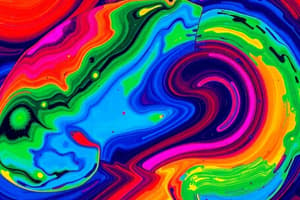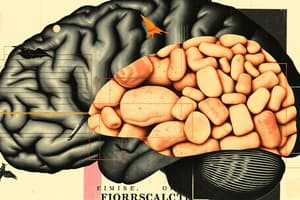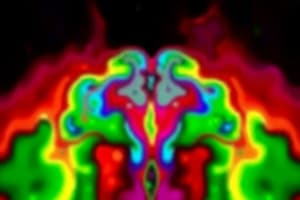Podcast
Questions and Answers
Which neuroimaging technique has excellent temporal resolution?
Which neuroimaging technique has excellent temporal resolution?
- MEG (Magnetoencephalography)
- PET (Positron Emission Tomography)
- fMRI (Functional Magnetic Resonance Imaging)
- EEG (Electroencephalography) (correct)
Which neuroimaging technique measures changes in blood oxygenation levels to infer brain activity?
Which neuroimaging technique measures changes in blood oxygenation levels to infer brain activity?
- CT (Computed Tomography)
- fMRI (Functional Magnetic Resonance Imaging) (correct)
- EEG (Electroencephalography)
- MEG (Magnetoencephalography)
Which neuroimaging technique is commonly used in clinical settings to diagnose epilepsy?
Which neuroimaging technique is commonly used in clinical settings to diagnose epilepsy?
- DTI (Diffusion Tensor Imaging)
- MEG (Magnetoencephalography)
- EEG (Electroencephalography) (correct)
- fMRI (Functional Magnetic Resonance Imaging)
Which neuroimaging technique has relatively poor spatial resolution due to signal distortion passing through the skull and scalp?
Which neuroimaging technique has relatively poor spatial resolution due to signal distortion passing through the skull and scalp?
Which neuroimaging technique records the summation of postsynaptic potentials from thousands of neurons?
Which neuroimaging technique records the summation of postsynaptic potentials from thousands of neurons?
Flashcards are hidden until you start studying
Study Notes
Neuroimaging Techniques
- Electroencephalography (EEG) has excellent temporal resolution, allowing it to measure neural activity on a millisecond timescale.
- Functional magnetic resonance imaging (fMRI) measures changes in blood oxygenation levels to infer brain activity, providing a indirect measure of neural activity.
- EEG is commonly used in clinical settings to diagnose epilepsy, as it provides a non-invasive and cost-effective way to measure abnormal electrical activity in the brain.
- Magnetoencephalography (MEG) has relatively poor spatial resolution due to signal distortion passing through the skull and scalp, making it less accurate for localizing brain activity.
- EEG records the summation of postsynaptic potentials from thousands of neurons, providing a measure of neural activity at the scalp level.
Studying That Suits You
Use AI to generate personalized quizzes and flashcards to suit your learning preferences.




